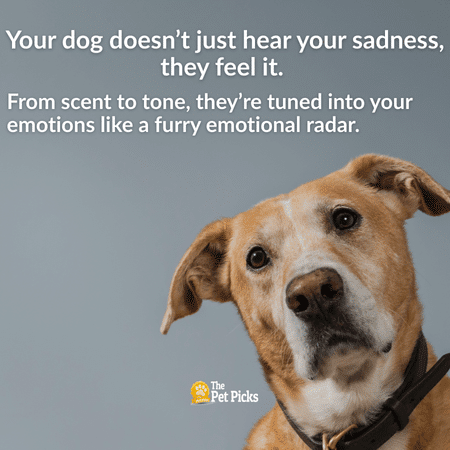That Look in Their Eyes? It Means More Than You Think
If you've ever had your dog curl up beside you during a bad day, you're not imagining things. Dogs really do have an uncanny ability to tune into how we're feeling. From the subtle shift in your tone of voice to the scent of your stress, your pup is constantly picking up on clues. But how do they do it, and why does it matter? In this guide, we'll explore the emotional intelligence of dogs and how it shapes the bond you share.
A Nose for Emotions: Why Your Dog Smells Your Sadness
Dogs have up to 300 million olfactory receptors in their noses. To put that in perspective, humans have about 6 million. This means that your dog isn't just sniffing out dinner scraps, they're also picking up on the hormonal changes that come with your emotions.
When you're stressed, your body releases cortisol. When you're anxious, adrenaline kicks in. And when you're sad, your body chemistry changes in subtle but detectable ways. Your dog can smell those shifts. In fact, studies suggest that dogs can distinguish between sweat from people who are fearful and those who are happy.
This incredible sense of smell is part of what allows service dogs to alert to anxiety attacks or detect seizures before they happen. But even the average family dog can pick up on when something's not right, and often respond with a comforting nudge, paw, or snuggle.

More Than Puppy Eyes: How Dogs Read Your Body Language
Dogs are masters at reading nonverbal cues. They’ve lived alongside humans for thousands of years, adapting to our routines, moods, and movements. Research shows that dogs can distinguish between different facial expressions and even match them to emotional sounds. So when you sigh and slump on the couch, your dog isn’t just reacting to the noise. They’re watching the whole scene.
Body language, like posture, gestures, and pace of movement, sends strong signals to your pup. Quick, jerky movements might signal stress or anger, while slow, relaxed gestures suggest calm. Eye contact also plays a big role. While a hard stare might feel threatening, soft eye contact is often your dog’s way of saying, “I’m with you.”
Dogs also rely on what's called “emotional contagion.” This means they can mirror your mood. If you’re energetic and joyful, they might zoom around the house. If you’re quiet and withdrawn, they’ll often lower their energy to match yours. It's their way of syncing with your emotional state, just like a best friend would.
Tone Matters: Why Your Dog Listens to How You Say It
Your dog may not understand every word, but they’re always listening to how you say it. High-pitched baby talk? That likely means playtime or praise. A low, flat voice? That could be a sign that something's wrong, and your dog takes note.
Research from the University of Sussex found that dogs process the emotional tone in human speech in the same brain region we use. In other words, they’re wired to pick up on the emotions behind your words. This helps them differentiate between praise, commands, and distress.
It also explains why your pup might come running when they hear you crying, even if you haven’t called for them. They’re not just reacting to noise. They’re responding to emotion and their instinct is to be close.

Emotional Bonding: The Real Reason Your Dog Cares
Why do dogs even bother tuning into our emotions? The answer lies in their deep bond with us. Over generations, dogs have evolved to be our companions. Unlike other animals, dogs actively seek out human eye contact, follow our pointing gestures, and try to interpret our moods.
This isn’t just learned behavior. Studies using fMRI scans show that dogs' brains light up in response to their humans' scent more than that of strangers. They’re not just reacting out of habit. They’re emotionally invested.
This emotional bonding is why dogs make such effective therapy animals. Their ability to sense and respond to human emotion isn’t just impressive, it’s healing.
What Your Dog’s Response Might Look Like
Dogs show empathy in different ways, depending on their personality. Some might:
- Cuddle closer or lean against you
- Bring you a toy as a distraction
- Lick your hands or face gently
- Follow you more closely than usual
- Stay quiet and still, watching carefully
These aren’t random behaviors. They’re signs that your dog is tuned in and trying, in their own way, to help.

Building an Emotionally Aware Relationship
Now that we know dogs can detect and respond to our emotions, how can we strengthen that connection?
- Stay emotionally present: Dogs don’t fake it, and they know when you are. Being authentic around your dog helps build trust.
- Use a calm tone when possible: Especially in times of stress, your dog will take emotional cues from your voice.
- Reward empathy: If your dog offers comfort, acknowledge it. A gentle pat or kind word reinforces their instinct.
- Create routines: Dogs thrive on predictability. A stable routine helps them feel secure, which in turn deepens their emotional connection to you.
Final Thoughts: Your Dog Is More Than Just a Pet
Understanding your dog’s emotional awareness changes the way you see them. They’re not just reacting, they’re relating. They’re not just nearby, they’re with you.
Every sigh, laugh, or moment of silence sends signals. And your pup, loyal as ever, listens to it all. It’s one more reason to treasure that wagging tail and the warmth beside you on hard days. Because at ThePetPicks.com, we know that a dog’s love isn’t just felt, it’s earned through every moment you share.
FAQs
Can dogs really tell when you're sad?
Yes, dogs can often detect sadness through body language, vocal tone, and scent. Many will respond with comforting behaviors like cuddling or staying close.
How do dogs respond when they sense stress or anxiety?
They might follow you around more, act subdued, or try to distract you with toys or affection. Some dogs become protective, positioning themselves between you and others.
Can dogs mirror our emotions?
Absolutely. This is called emotional contagion. Dogs can reflect our moods and often adjust their energy to match ours.
Is it true that dogs can smell emotions?
Yes. Dogs have an extraordinary sense of smell and can detect changes in your body chemistry related to stress, fear, or sadness.
Can I train my dog to support me emotionally?
While many dogs do this instinctively, you can reinforce the behavior with positive feedback. Some dogs can even be trained as emotional support or therapy animals.
A Loving Reminder
The information provided at ThePetPicks.com is based on research and expertise, aiming to enhance the bond between you and your dog. However, it’s essential to remember that every dog is unique. Always consult with professionals, like veterinarians or trainers, for specific concerns or advice. At ThePetPicks.com, we believe in “Trust Born from Love,” and we encourage every pet parent to make informed decisions rooted in love and care.

